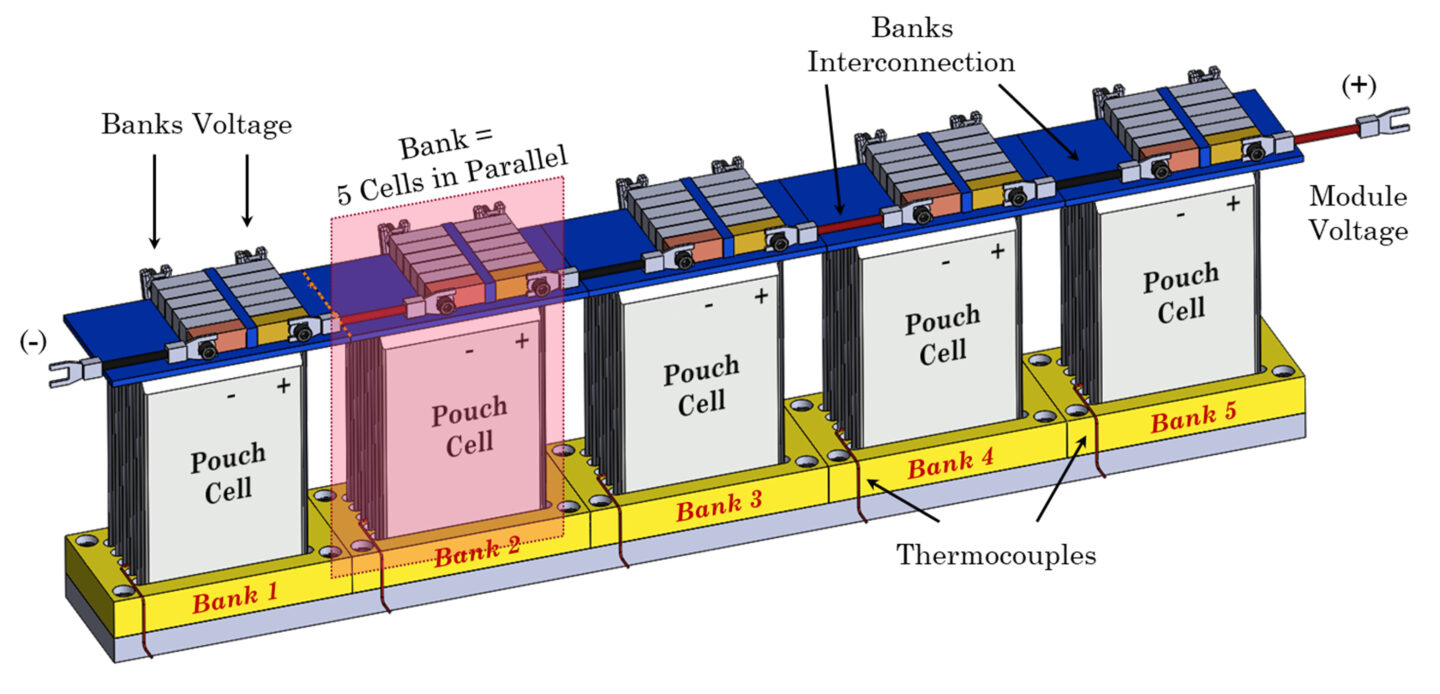
Open Science Data
ESRI openly publishes results obtained from aging studies on lithium-ion cells and modules of two different cell formats.
Data has become vital in the face of the growing rise of heuristic methods such as machine learning or artificial neural networks and the need to learn about battery life and performance. For this reason, the Electrochemical Safety Research Institute makes data we obtained in the cycle life tests carried out on lithium-ion batteries public so that other research groups can use them to develop new knowledge.
Unlike the cylindrical cells that have protective devices embedded within the cell that protect against overcharge, large currents (external short circuit), and high temperatures, pouch cells are not designed with those devices. In this work, the behavior of fresh and aged pouch cells and modules under off-nominal conditions is investigated. The aging data for all test articles is shared here.
Cycle life aging data for pouch cells and modules.

The pouch cell has graphite as the anode and nickel-cobalt-aluminum oxide (NCA) as the cathode active materials.
Modules have a 5P5S (5 cells in parallel (bank), 5 banks in series) configuration.
Data Repositories
- Cycle Life Aging Test – Pouch Cell – Single Cell
- Aging Test – Pouch Cell – Single Cell – Part 01 (Cell 1)
- Link: https://zenodo.org/record/7659061#.Y_aJKHZMGiM
- DOI: 10.5281/zenodo.7659061
- Number of Files: 21
- Aging Test – Pouch Cell – Single Cell – Part 02 (Cell 2)
- Link: https://zenodo.org/record/7659010#.Y_aJKXZMGiM
- DOI: 10.5281/zenodo.7659010
- Number of Files: 28
- Aging Test – Pouch Cell – Single Cell – Part 03 (Cell 3)
- Link: https://zenodo.org/record/7659075#.Y_aJKnZMGiM
- DOI: 10.5281/zenodo.7659075
- Number of Files: 28
- Aging Test – Pouch Cell – Single Cell – Part 04 (Cell 4)
- Link: https://zenodo.org/record/7659085#.Y_aJLHZMGiM
- DOI: 10.5281/zenodo.7659085
- Number of Files: 29
- Aging Test – Pouch Cell – Single Cell – Part 05 (Cell 5)
- Link: https://zenodo.org/record/7661182#.Y_aJYnZMGiM
- DOI: 10.5281/zenodo.7661182
- Number of Files: 18
- Aging Test – Pouch Cell – Single Cell – Part 06 (Cell 6)
- Link: https://zenodo.org/record/7661238#.Y_aJY3ZMGiM
- DOI: 10.5281/zenodo.7661238
- Number of Files: 18
- Aging Test – Pouch Cell – Single Cell – Part 07 (Cell 8)
- Link: https://zenodo.org/record/7661288#.Y_aJZHZMGiM
- DOI: 10.5281/zenodo.7661288
- Number of Files: 21
- Aging Test – Pouch Cell – Single Cell – Part 08 (Cell 9)
- Link: https://zenodo.org/record/7661328#.Y_aJZXZMGiM
- DOI: 10.5281/zenodo.7661328
- Number of Files: 20
- Aging Test – Pouch Cell – Single Cell – Part 09 (Cell 10)
- Link: https://zenodo.org/record/7661357#.Y_aJZnZMGiM
- DOI: 10.5281/zenodo.7661357
- Number of Files: 17
- Aging Test – Pouch Cell – Single Cell – Part 10 (Cell 157)
- Link: https://zenodo.org/record/7661392#.Y_aJ6nZMGiM
- DOI: 10.5281/zenodo.7661392
- Number of Files: 26
- Aging Test – Pouch Cell – Single Cell – Part 11 (Cell 158)
- Link: https://zenodo.org/record/7661699#.Y_aKR3ZMGiM
- DOI: 10.5281/zenodo.7661699
- Number of Files: 33
- Aging Test – Pouch Cell – Single Cell – Part 12 (Cell 159)
- Link: https://zenodo.org/record/7661956#.Y_aKR3ZMGiM
- DOI: 10.5281/zenodo.7661956
- Number of Files: 27
- Aging Test – Pouch Cell – Single Cell – Part 13 (Cell 187)
- Link: https://zenodo.org/record/7662128#.Y_aKSHZMGiM
- DOI: 10.5281/zenodo.7662128
- Number of Files: 28
- Aging Test – Pouch Cell – Single Cell – Part 14 (Cell 188)
- Link: https://zenodo.org/record/7662270#.Y_aKSXZMGiM
- DOI: 10.5281/zenodo.7662270
- Number of Files: 13
- Aging Test – Pouch Cell – Single Cell – Part 01 (Cell 1)
- Cycle Life Aging Test – Pouch Cell – Modules
- Aging Test – Pouch Cell – Modules – Part 01 (Module 3)
- Link: https://zenodo.org/record/7665331#.Y_aKS3ZMGiM
- DOI: 10.5281/zenodo.7665331
- Number of Files: 77
- Aging Test – Pouch Cell – Modules – Part 02 (Module 4)
- Link: https://zenodo.org/record/7662294#.Y_aKTXZMGiM
- DOI: 10.5281/zenodo.7662294
- Number of Files: 58
- Aging Test – Pouch Cell – Modules – Part 01 (Module 3)
References
The aging data for pouch single cells and modules were published in the following journal publication:
Degradation-Safety Analytics in Lithium-Ion Cells: Part III. Aging and Safety of Pouch Format Cells
Aging due to cycle life refers to all the degradation processes associated with the charge and discharge processes. Every time a Li-ion cell is cycled, its capacity reduces in an imperceptible way. In the long-term cycling, the cell loses a significant amount of its initial capacity. The rate of capacity loss depends upon multiple factors like operating temperature, cycling protocol, C-rate, and the charge/discharge cut-off voltages. Determining the actual state of health of the cells after cycling is essential for recycling or repurposing them in secondary-use applications.
Cycle life aging data for cylindrical cells and modules.

The 18650 cell has graphite as anode and nickel-cobalt-aluminum oxide (NCA) as cathode active materials.
Module has a 3P9S (3 cells in parallel (bank), 9 banks in series) configuration.
Data Repositories
- Cycle Life Aging Test – Cylindrical Cell – Part 01 – Single Cells
- Link: https://zenodo.org/record/7658813#.Y_aIQ3ZMGiM
- DOI: 10.5281/zenodo.7658812
- Number of Samples: 21.
- Cycle Life Aging Test – Cylindrical Cell – Part 02 – Modules
- Link: https://zenodo.org/record/7658825#.Y_aI6nZMGiM
- DOI: 10.5281/zenodo.7658824
- Number of Samples: 2
References
The aging data for cylindrical single cells and modules were published in the following journal publications:
Stay informed
Sign Up for Updates
Knowledge and awareness about potential hazards associated with scientific innovations help in minimizing risks and promote best practices that improve safety. Sign up to learn more about our initiatives, partnerships, upcoming events, and free resources.
By clicking submit, I agree to receive communications from UL Research Institutes (ULRI) containing news and updates about its work and initiatives. I understand that I can manage my preferences at any time and agree to ULRI’s online policies.
Partnerships
Everyone benefits when world-class institutions work together to take on big challenges. Join us.
Grants
We’re funding scientific research to make the world safer, healthier, and more sustainable. Learn about funding opportunities.
Careers
Work to make the world a safer place. Start a rewarding career at UL Research Institutes with other socially minded colleagues focused on innovation, collaboration, and ethics.